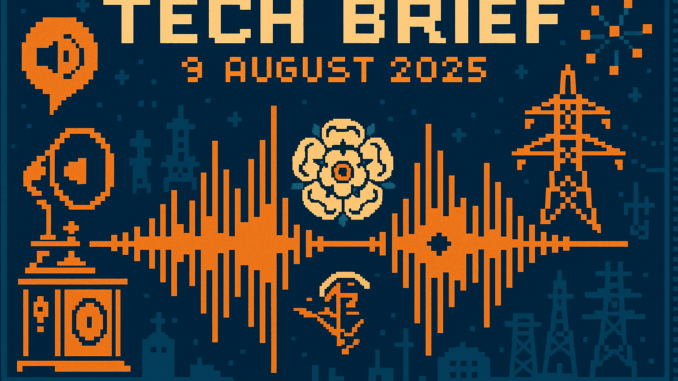
Does voice tech still trip over a Yorkshire accent in 2025? Tech Brief 9 August 2025 takes a proper look at British regional voice recognition, a horror football game sounding stranger than any Amiga mod, and the government’s latest smart energy push. Welcome to today’s essential stories, with a detour into Victorian telegraphy for good measure.
Missed yesterday’s Tech Brief? Catch up here before diving in.
AI Struggles With Yorkshire Accents in Political Chatbot Rollout
“Ey up, will it understand me?” This was the acid test for Mark Sewards, Leeds’s first AI avatar MP. Launched to help constituents, his digital copy speaks in his own voice, fielding everyday queries. The problem: it’s still baffled by local twang. Decades after speech tech first faltered with regional British dialects, not much has changed for Northerners who say “bath” as in “math.” Back in the dial-up days, local folks just typed their queries, since early voice systems treated regional accents like malware; they couldn’t tell “bath” from “math” no matter how clearly you shouted. While this avatar might mean faster answers when the council holds you on the line, the classic quirk remains. Technology interprets Southern, but struggles once you hit the M62 corridor. Is typing still safer for British users outside the capital? Maybe that’s not a bug, just tradition.
‘Fear FA 98’ Fuses Football With Survival Horror, Baffling and Delighting Fans
A football match, a misty pitch, and suddenly you’re dribbling a decapitated demon’s head instead of a proper Mitre. That’s Fear FA 98, the new game blending FIFA 98’s mechanics with Silent Hill’s vibe: a crossover so odd even the most sleep-deprived demo scener might blink. One developer joked, “You know it’s gone too far when the half-time oranges bite back.” Retro threads from the late 90s are full of modders hacking games together, but this one takes genre-mangling to a fever pitch. Expect online mayhem, gory power-ups, and ridiculous team taunts, all seasoned with a proper indie spirit. For those who miss when PC gaming felt like your mate’s bedroom LAN party, the weirdness is a kind of homecoming. Modern football, but haunted.
UK Pushes AI and Smart Grids to Combat Peak Electricity Demand
Electricity use in Britain is surging, especially with more EVs and data centres. Now the government is deploying AI forecasting, smarter meters, and even tapping car batteries, hoping to avoid blackouts and slash carbon emissions. National Grid strategists have borrowed a trick from 1980s engineers: treat every watt like gold dust and automate the lot. The plan is to crunch real-time demand data, flatten peak loads, and pay households for feeding back spare power. Old heads might see flashes of the BBC Micro ethos: solve it in software, then make the hardware keep up. As AI sneaks into energy control, this new wave recalls the kind of holistic tinkering that once made British innovation a badge of pride. Will it work this time?
From the Wayback Machine
On This Day: 1872 – Edison’s improved duplex telegraph system enabled two-way messaging on a single line. This allowed rival operators to send signals in both directions, making telegraph communication cheaper and quicker. That principle is still present when you load several web pages on a single broadband line, or use Wi-Fi that chats both ways at once. The old world of relays and magnets now shapes how we balance bandwidth in digital life.
What This Means
If Tech Brief 9 August 2025 has one lesson, it’s that technical groundwork never expires. Whether translating your Gran’s Yorkshire into chatbot replies or piping energy more efficiently across Britain, the solutions are both old and new. Sometimes, it’s not about progress but better balancing what we’ve already got.
Spilled tea is less dangerous than a power surge, so keep your cuppa away from the keyboard. Stay curious, keep tinkering, don’t fear the reboot.
Missed yesterday’s Tech Brief? Catch up here

Leave a Reply